The following article is reprinted with permission © 1998 Sandlapper Society.
A Very Special Family Profile
by Aïda Rogers
When I lost my father, I couldn’t understand why that happened. Family and friends ask why I go to Super Weekend every year. If they could only see what we have, they’d understand.
Dewayne Crite
1994 James F. Byrnes scholar
This story is to help them understand
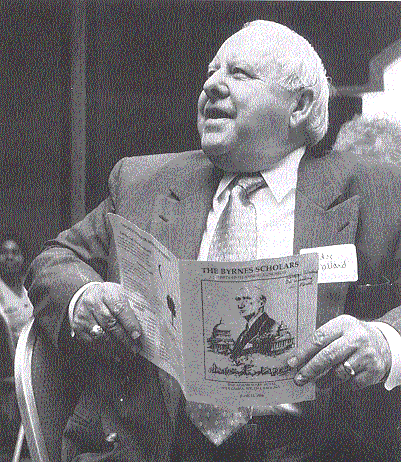
Photo by Richard Durlach: Judge Bobby Mallard of Charleston, 1959 Byrnes scholar, shares a laugh at the scholar’s June luncheon.
Somewhere in the dim mists of my college years, I remember hearing about Byrnes scholars. The girl I shared a bathroom with was one. Bootsie was quiet. It was her roommate Ann who told me her father had died years ago. Somehow I made the connection that Bootsie had her scholarship because she didn’t have a father. I also knew she had a friend outside our Capstone 18th floor circle, a girl named Henri, who also was a Byrnes scholar. In my young, self- absorbed way, I never thought more about it.
“Where’s Boots?” I remember asking Ann. “At one of those Byrnes things,” Ann would say. I still feel my face puzzling, and I still see Ann shrugging. For us – both parents alive, from households where college was so expected it wasn’t even discussed – we just didn’t understand.
Later, when I was at my first “real” job in North Myrtle Beach, Bootsie came to visit. It was a Sunday afternoon, and she had just left the Byrnes Super Weekend in Garden City. I don’t remember what we talked about, but it wasn’t Super Weekend. She probably knew it wouldn’t sink in.
But now it has. I’ve been baptized by the Byrnes Family. I made it through a Super Weekend and was feted at the June luncheon. I’ve sung “Carolina Moon” and played crazy games at the beach. After lots of conversations, I may know more about The Byrnes Foundation and the miracle man who started it than some of the 900 people who’ve won scholarships since 1949.
It’s a great story. I hope you read it.
I don’t know where I would be without my Byrnes scholarship
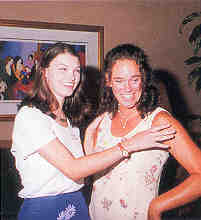
Photo by Richard Durlach: 1996 scholars Jennifer Brigman (left) and Laura Whitlock at the 1998 June luncheon.
“I don’t know where I would be without my Byrnes scholarship,” says Natalie Owens, an ’86 scholar from Columbia. It’s a frequently heard comment at Super Weekend, the annual gathering that draws current and alumni scholars to Chapel by the Sea in Garden City. It’s here where an outsider can become an insider; indeed, spouses and children have been making the pilgrimage since 1964, when Super Weekend was started. It’s a nod to the first “super weekend” of 1951, when Gov. James F. Byrnes took about 90 of his scholars to his home at Isle of Palms. Those scholars are pushing 70 today, but they still remember the chocolate ice cream cones, the Coast Guard boat trips and the limousine rides.
They also remember visiting him and his wife Maude at the governor’s home – the unassuming Byrnes disliked the word “mansion” – and singing around the piano with them. To them, Byrnes was a beloved benefactor who made possible the thing he always wanted but never had: a college education. Through the foundation he established in 1948, he was able to award scholarships to students like himself – academically gifted, community-minded and financially needy. There were only two other qualifications: Recipients had to be from South Carolina, and one or both parents had to be dead. It’s painful to be a Byrnes scholar.
Byrnes made the most of what he had. His father died before he was born, and his mother, a seamstress, taught him shorthand. He parlayed that skill into court reporting, which later led to reading the law. Though he quit school at 14, he became a newspaper editor, lawyer, solicitor, congressman, senator and governor. While in Washington, he was appointed Supreme Court justice, secretary of state and “assistant president” to FDR during the crucial World War II years. When he came back to South Carolina in 1949, he began his dearest project: He started a family.
And what a family it is. Byrnes events are noisy affairs, full of hugging and kissing, laughing and crying. Scattered now across the country, “brothers” and “sisters” range from 18 to 67; they’re black, white, Asian, married, divorced, single, pregnant, parents, grandparents. Young men with earrings and ponytails are “brothers” to men who could be their grandfathers. Alumni children, or “Byrnes grandkids,” are clucked over and scolded; they’re friends with each other.
There’s even some inbreeding. Not too many years ago, a “sister” married a “brother” – something Byrnes always wanted. Board member Dal Poston, a 1974 scholar from Taylors, started the trend by marrying the daughter of long-time executive secretary Margaret Courtney. Years later, he introduced his uncle to Nancy Norton Drew, a 1959 scholar, board secretary and sister to Rev. Hal Norton, a 1949 scholar and board president. Now that Nancy Norton Drew has married Dal Poston’s uncle, three Byrnes scholars are metaphorical double first-cousins. “We fish in the same stream,” Hal Norton deadpans, before turning serious. “Relationships are begun here, but they’re very deep relationships. Dal and I are more than friends, We aren’t blood kin, but we’re kin, and that’s the way it is for a lot of people here.”
And so it is. Scholars graduate and remain friends; they vacation together and put each other up when they’re passing through town. Younger scholars consult older ones for advice – which the older scholars did with Byrnes himself. Henri Duncan of Columbia and Johnna Edmunds of Clover, both 1979 scholars, are roommates now in Columbia. “Once a Byrnes scholar, always a Byrnes scholar,” observes Dr. Bill Rowe, a 1949 scholar and board treasurer. He, like many alumni, speculate they became the children Maude and Jimmy Byrnes never had.
“Mom and Pop Byrnes wanted the scholarship to be more than just a check,” Rowe upholds. In truth, scholars are practically forced to bond. Current scholars are required to attend Super Weekend in March, the annual June luncheon in Columbia and fall dinners near their colleges with local alumni scholars.
Likewise, they must submit to a family tradition or two – like the singing of “Carolina Moon” and “Let Me Call You Sweetheart,” Byrnes’ favorite songs. If Maude and Jimmy Byrnes wanted a family, they got it: Twenty-six years after his death, those scholars are still singing.
We’re family
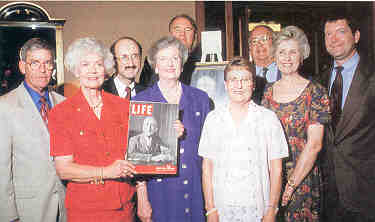
Photo by Richard Durlach: The James F. Byrnes Foundation Board of Directors – (from left) Dr. Bill Rowe, Lois Anderson, Charles Wall, Carol Ann Green, Dal Poston (behind), Jeanette Cothran, Rev. Hal Norton (behind), Nancy Drew Poston, Deaver McGraw III.
“Punctuality is something you absolutely must, must, must respect,” preaches Lois Anderson to a room of scholars at Super Weekend. “Respond, respond, respond, respond, respond,” she emphasizes minutes later about the meaning of RSVP.
Anderson remembers when she was Lois Hatfield, intimidated by wealth, uncertain about table manners. Her hour-long etiquette class has become a Super Weekend staple, with some alumni scholars sitting in to refresh themselves on social graces.
On the agenda are tips for shaking hands – “Don’t crunch their bones and don’t give them the dead fish” – and the skinny on hats: “You guys need to know that if you are socially correct, the hat has to go. I don’t let anybody sit at my table with a hat on, and that you can call archaic if you want to.”
Proper use of answering machines, how to deal with cherry tomatoes, what to do with your napkin when you’re finished eating, the necessity of thank-you notes and the unacceptability of obscenities are covered by Anderson, a Lee County native and Coker College graduate. Too well she remembers her jitters in 1950, when she met the Byrnes for the first time at their Spartanburg home. Armed with pointers from a helpful teacher – “start at the outside of your silver and work your way in, and watch your hostess” – she was relieved to be greeted by a lunch on paper plates with wooden spoons. “It was wonderful,” she recalls.
The Byrnes were wonderful, and the scholarship changed her life, says Anderson, a former teacher. “It’s given me a greater appreciation for what a little old country girl can learn and be as a result of an education. It’s an absolute fact I could never have gone to college had it not been for the Byrnes scholarship. I was a half orphan when I got it, I was a full orphan when I finished with it, and there was just no way!”
Anderson treasures Maude Byrnes’ sewing basket, filled with receipts, programs and drafts of notes. The Byrnes were exemplary role models. She tries to pass on through her etiquette classes some of what she’s been taught. “It is important that you know what to do when you go somewhere that’s going to have an influence on the rest of your life,” she sums up. As class is dismissed, she tells the students to call any time with questions – collect, she adds quickly.
They understand the best
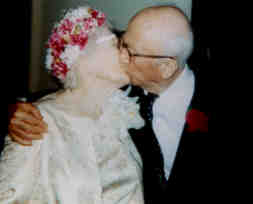
Photo courtesy Becky Roach. “I was trying to snap a photo of Mom and Pop Byrnes, and he said, ‘I’ll give you something to photograph.’ With that, he reached over, grabbed her, and gave her a big kiss. There’s no doubt who either was singing about when they sang ‘Let Me Call You Sweetheart.'”
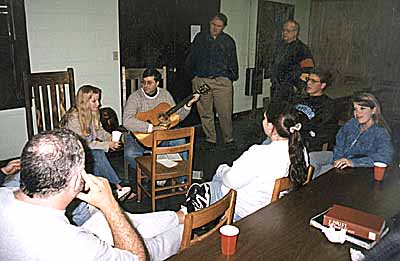
Photo courtesy of Allen Easler: Ron Cobb, with guitar, leads a group of scholars in a late-night Super Weekend singalong.
“Frankly, I feel like a little of a schmuck for having been away for so long,” Ron Cobb, 36, is saying. He’s just finished the final event of Super Weekend: a seafood buffet lunch in Murrells Inlet followed by the traditional singing of “On Top of Old Smoky,” which is usually led by Judge Bobby Mallard, a 1959 scholar from Charleston. Cobb, a Gaffney native, has been picking up degrees from Wake Forest and Princeton since he graduated from Furman in 1984; he’s missed only two Super Weekends in 18 years. Now he’s in Boston, working on a Ph.D. in clinical psychology, and getting married soon. Like others who take “the family” seriously, he’s brought his fiancée. She needs to pass inspection.
“It’s important to me that she feel at home in this family because I don’t want to be pulled away from this group,” Cobb explains. “It’s an important relationship for me and I don’t want to lose it.”
Some spouses haven’t been interested in the Byrnes family, and eventually those scholars lose touch, he says. But Cobb brought fiancée Jan Weathers to meet his family in Gaffney last year. That same week, he brought her to Super Weekend. “This is the best weekend of my year, and the good thing is I get to do it every year,” he says.
Cobb is a favorite at Saturday night’s talent show, where he plays guitar and sings funny songs by Mike Cross. The regulars sing along with the choruses, and children sit on their parents’ laps, swinging their legs and clapping. For Cobb, an admitted introvert whose father died when he was 17, performing proves how emotionally helpful his scholarship was. “I needed to be with people who understood, and I also needed a group I could give back to,” he reflects. “Knowing myself, I may have never talked things over with people who had also been through this kind of pain.”
For Cobb, it was especially important to come to Super Weekend 1998. His sister recently died. “This is the time I want to be with this family the most, because they understand the best.”
Ditto, says Mark Matlock, a Greenville newspaper editor whose wife Elaine, a 1976 scholar, died two years ago. Matlock has brought 9-year-old daughter Rachel to Super Weekend to soak up the support. “I told my family about it, how wonderful it was, but they really got a first-hand look at the Byrnes scholars at Elaine’s funeral,” he remembers. “It seemed like every other person that came up said, ‘I’m a Byrnes scholar and I heard about Elaine.’ My dad said, ‘Boy, they just come out of the woodwork, don’t they?'”
Meanwhile, Ron Cobb wants to come back home. “When I think about settling someplace for the rest of my life, it’s because of the Byrnes family. I want to play a role in the foundation and carry on the tradition. That needs to survive.”
The rumbly voiced Hal Norton – sometimes solemn, most times jovial – maneuvers Super Weekend from opening barbecue to seafood finale. The most emotional moments come Saturday night, when graduating seniors are invited to talk. Some thank the board for being chosen; others get teary. One young man challenges other seniors not to “toss this aside.” Emily Tingle, a summa cum laude senior at Presbyterian College who’ll teach English in China next year, has this to say: “Our sorrow is turned to joy and I just want to thank you for that.”
Norton looks over the room and delivers the ultimate compliment. “If someone were looking for a son or daughter, they could come here, but they’d have a problem. They wouldn’t know which one to take.”
This exhausted reporter over-sleeps Sunday, missing breakfast. But she scrambles to worship services. At its conclusion, board member and “family photographer” Charles Wall gives instructions for the official Super Weekend photo. There’s a lot of laughing as Wall explains how to line up so every face can be seen. And then we’re off, everyone carrying a chair to the lodge where the picture will be taken.
I lumber with them, notebook under one arm, chair under the other. I’m just planning to watch all the wiggling as Wall does his thing. But Deaver McCraw, Easley computer consultant and ’78 scholar, is walking beside me. “You’re going to be in the picture, aren’t you? You’re part of the family now.”
Too surprised to say anything, I take my place with the rest. Two little girls are sitting in front of me, an older man stands to my right, McCraw on my left. We smile for the camera. This picture is a keeper.
